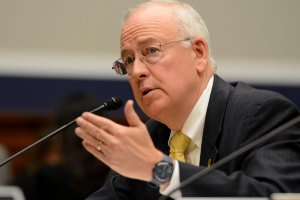Rabbi David Saperstein, whose term as Ambassador-at-Large for International Religious Freedom ended in January, reviewed the past two years of accomplishments and challenges in promoting freedom of religion or belief around the world, speaking at a panel discussion February 9 in Washington, D.C.

Catholic News Agency (CNA) reports that Rabbi Saperstein is proud of the March 2016 declaration by Secretary of State John Kerry that Islamic State actions against Christians, Yazidis and Shia Muslims in Iraq and Syria constituted genocide. Rabbi Saperstein called on the Knights of Columbus and In Defense of Christians advocacy group to provide documentation of a fact-finding mission to Iraq, resulting in a 300-page report on atrocities against Christians and other minorities.
CNA Matt Hadro reports that a week later, Secretary Kerry issued the genocide declaration. The designation gives the persecuted minorities priority resettlement status, access to humanitarian aid and safe return home if they desire it. In an interview with CNA, Saperstein noted that the U.S. “had already been acting as if there was such a finding” by sending aid to Yazidis in 2014 and establishing a military coalition to counter the Islamic State.
Rabbi Saperstein stated that even with the progress made, it is important to remember that “three-fourths of the world’s population still lives in countries like China, India, and Pakistan where freedom of religion is significantly restricted.”
The “Tolerance: A Key to Religious Freedom” discussion was moderated by U.S. Commission on International Religious Freedom chair Thomas J. Reese, S.J., and hosted by Religion News Foundation, a secular nonprofit organization that advances religious literacy.
Panelists included former Congressman Frank Wolf, Distinguished Senior Fellow of 21st Century Wilberforce Initiative; Ms. Joyce Dubensky, Esq., CEO, Tanenbaum Center for Interreligious Understanding; Dr. John Sexton, President Emeritus, New York University, and President, The Catalyst Foundation for Universal Education; and Rabbi Saperstein.
The Ambassador-at-Large is mandated to make recommendations on international religious liberty issues to the President, Secretary of State and Congress. The post is currently vacant but an unofficial short list of three candidates is circulating and religious freedom advocates have urged the new administration to make an appointment within the first 100 days.


